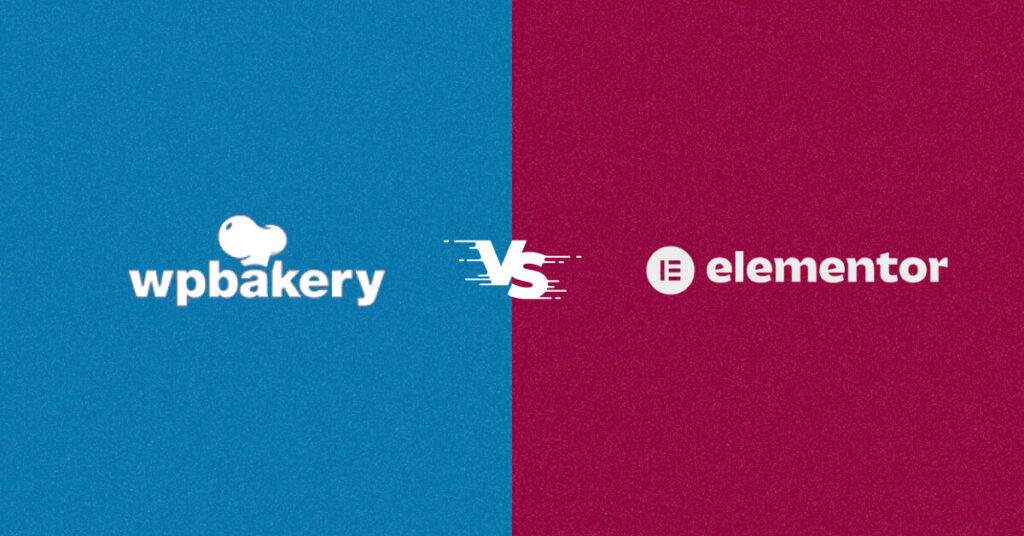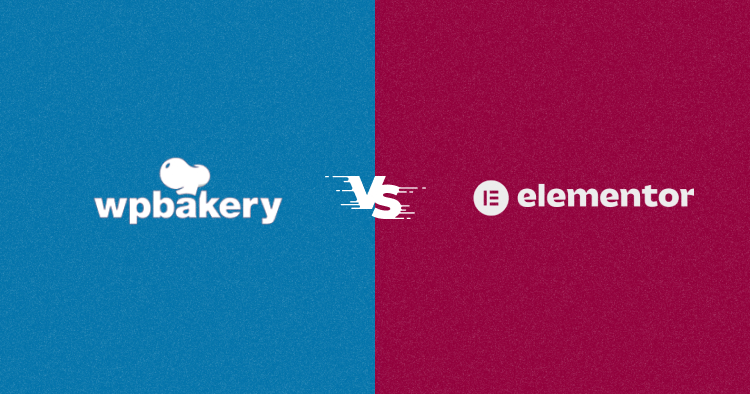
Creating a website is no more about complex codes and missing semicolons. Now you can have WordPress websites ready without a single line of code thanks to the availability of drag-and-drop page builders.
And among these, WPBakery and Elementor are two popular page-building options that are widely used for creating stellar websites.
But which of them is better? To make the choices easier for you, I’ll compare WPBakery and Elementor in this blog, along with all the important factors. In the end, you’ll have a better understanding of which page builder will be a better fit for your website. Let’s go!
WPBakery vs Elementor: At a Glance
| Features | WPBakery | Elementor |
|---|---|---|
| Interface and Ease of Use | More friendly for developers. | Friendly for beginners and even developers. |
| Pricing | Starts at $59. | Starts free. |
| Elements and Widgets | 50+ widgets available. | 40 available for free. 100+ with the paid version. |
| Compatibility with themes and plugins | Works seamlessly with popular themes and plugins. | Compatible with a wide range of themes and plugins. |
| SEO functionality | Short codes may impact SEO. | Excellent SEO functionality, slight page load impact. |
| Template library | 100+ templates available. | 100+ templates available |
| Support | Great support + community support. | Responsive support + thriving community. |
WPBakery vs. Elementor: Overview
Let’s now run through a brief overview of both page builders before taking a deeper dive into the comparison.
WPBakery

WPBakery is an advanced page builder with 4,300,000+ active users, balancing simplicity and customization. It appeals to developers who prefer coding for greater customization options. However, it is also beginner-friendly and was previously known as Visual Composer.
With its large user community, WPBakery provides excellent community support. To get started, you can easily purchase the plugin from the website and build impressive pages.
Some prominent features:
- 50+ widgets and elements.
- Custom CSS capabilities.
- Video background support.
- Multilingual support.
- Frontend and backend editing options.
Elementor

Elementor, the page builder behind 10 million websites (representing 7% of all live websites), is renowned for its user-friendly interface and simplicity.
It’s a very beginner-friendly page builder and even allows moderate customizations via coding for those seeking more control. The large and supportive Elementor community often provides solutions to queries, reducing the need to contact support.
You can easily download Elementor via the following route on your WordPress dashboard.
- Go to Plugins.
- Click on Add New.
- Search for “Elementor.”
- Install and activate the plugin.
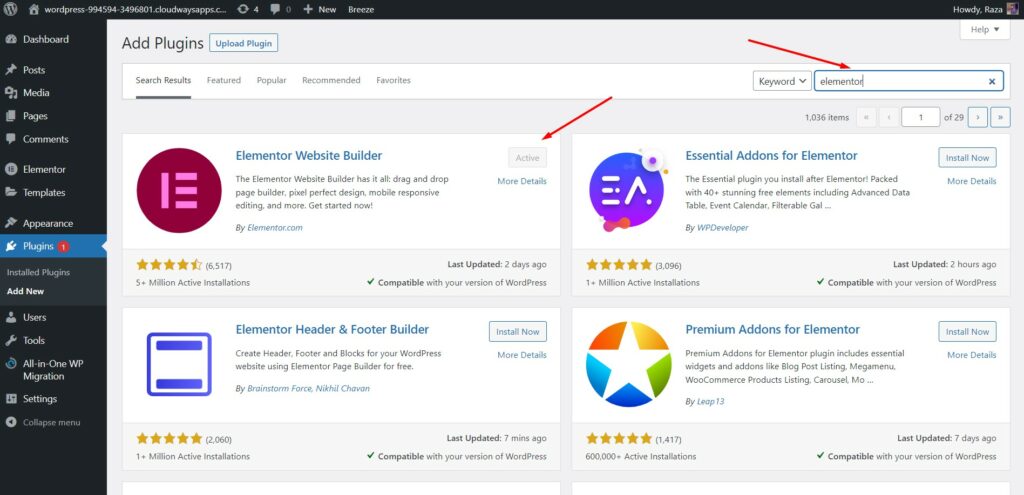
Key features of Elementor include:
- 40 widgets and elements available in the free version.
- Easy page-building capabilities.
- Intuitive interface ideal for beginners.
- Custom fonts and icons.
- Advanced settings for enhanced customization.
Page Builders + Reliable WordPress Hosting = Great Websites!
Cloudways’ managed WordPress hosting is specially optimized, which means no annoying loading times and performance issues.
WPBakery vs. Elemetor – Features Comparison
Let’s put both page builders to the test and evaluate their performance across different aspects, starting with the interface and ease of use. And if you use reliable and secure managed WordPress hosting, you can definitely make your website management faster and easier.
Interface and Ease of Use
Let’s analyse both plugins on this front.
WPBakery
WPBakery is definitely a user-friendly page builder plugin with moderate learning curve. It caters more to users who prefer coding flexibility. Beginners may encounter some initial challenges, but helpful YouTube tutorials are available for quick assistance.
Here’s how the backend looks with the plugin:
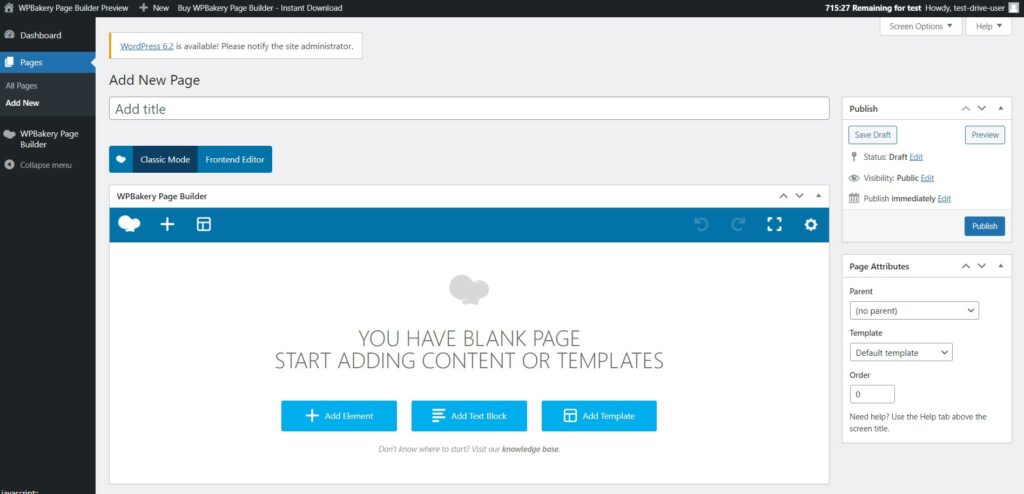
Notice the 3 buttons? That’s what you use to open up different elements for building your pages.
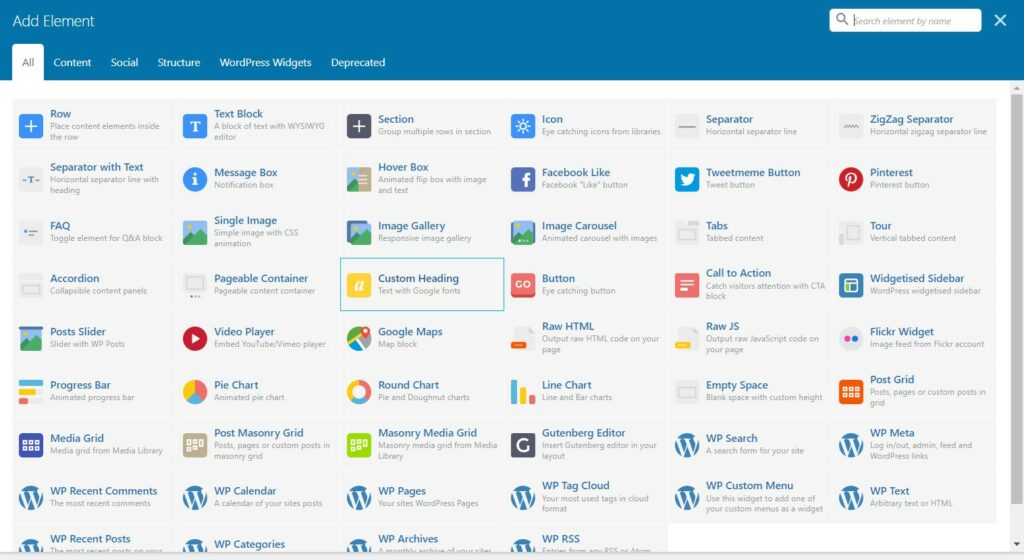
Upon clicking on “Add Elements,” a wide range of options became available to me. The extensive list covers most elements that a typical page would require. And for further customization, there are additional options to explore.
Elementor
Elementor is highly beginner-friendly, providing an intuitive and accessible interface. Its features are designed to be user-friendly and easy to understand. Beginners can quickly get started without significant difficulties, although some initial familiarization might be beneficial.
Here’s how Elementor’s backend looks like:
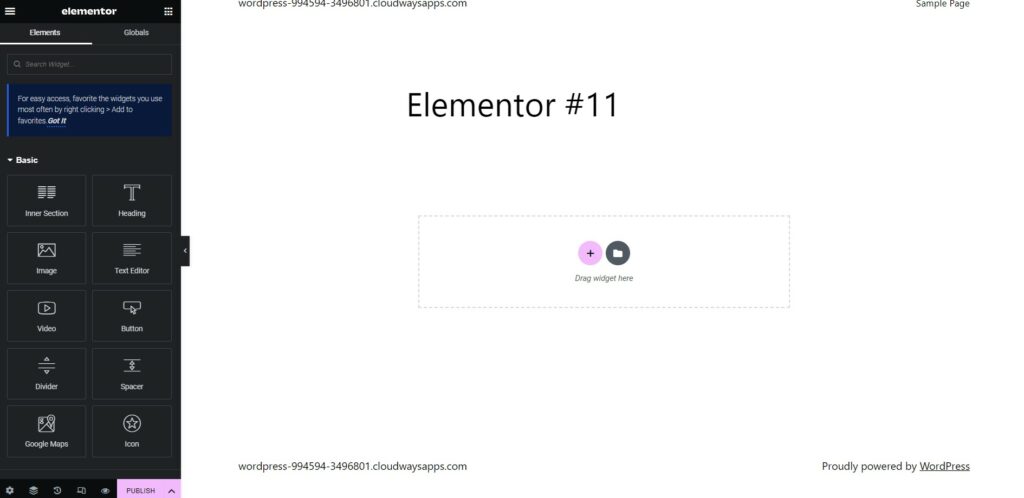
The backend interface conveniently presents all available elements on the left side for easy access. It offers a variety of options for design enhancements and functional additions.
Final Verdict: Elementor is generally considered easier to use than WPBakery, as it offers a more modern interface and a smoother learning curve.
Pricing
When choosing a plugin, pricing can be a make-or-break decision for many people. Let’s compare the pricing options for these two page builders.
WPBakery
WPBakery is a paid plugin with the following price structure:
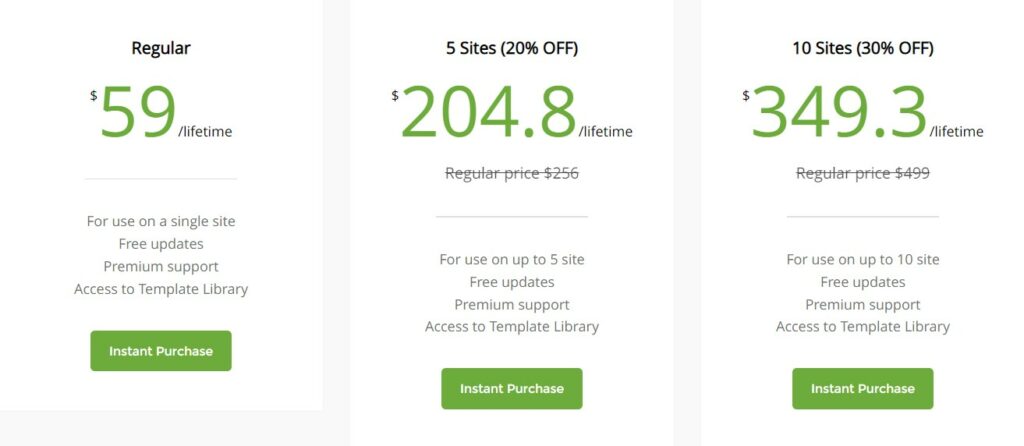
Elementor
Elementor offers the following pricing plan:

Final Verdict: Well, this one’s tricky. For the starter plan, WPBakery wins the game with the lifetime cost of $59, while Elementor charges $59 for one year.
Elementor also provides a free plan that’s limited to 40 widgets and elements, suitable for most beginners to moderate-level users. So, the scale tilts towards Elementor.
However, for other pricing models, it depends on your specific needs. Elementor’s $399/yr for 1000 websites if you manage an agency with multiple websites. On the other hand, if you manage a smaller number of sites, WPBakery’s lifetime plan at $349.3 can be a better choice.
Elements and Widgets
Elements and widgets are the components that you drag and drop to create a page. Both plugins are pretty decent in this regard but let’s take a deeper look at each of them:
WPBakery
WPBakery provides a wide range of options with over 50 widgets available. These widgets encompass the essential elements necessary for building your desired pages.

Additionally, more than 250 other elements and widgets are accessible through add-ons, ensuring a comprehensive selection.
Notable options include Google Maps integration, CTA buttons, a video player, and more. It also gives you charting options to create infographics, and you can easily incorporate your social media handles. Plus, HTML and Javascript options are available for customization.
Elementor
Elementor stands strong in competition with WPBakery. The plugin offers 40 elements with its free version, catering to the needs of most users. Paid users gain access to over 100 additional elements for extended functionality.

Advanced customization options allow you to personalize the elements according to your website’s theme and niche. Adding text elements, Google Maps, videos, images, and custom buttons is made simple.
Moreover, there are elements specifically designed to facilitate page building without coding, such as the Spacer element for creating spacing between page components.
Final Verdict: While WPBakery has a larger volume of widgets, Elementor emerges as the winner due to its offering of 40 widgets with the free version, which is sufficient for most users’ requirements.
Compatibility with Themes and Plugins
You know why WordPress became so popular? It lets users create neat websites quickly, thanks to a vast array of ready-to-use themes and plugins. And in this regard, WPBakery and Elementor both have almost equal standing.
WPBakery
WPBakery is compatible with all common themes and plugins available in the WordPress market. In fact, WPBakery already powers some of the popular themes. Here are a few examples:
- Gillion
- Jevelin
- Bridge
- The7
- uDesign
Elementor
Like WPBakery, Elementor is compatible with the most common themes and plugins. It serves as an excellent choice for both beginners and advanced developers.
Here are some themes that work well with Elementor:
- Astra
- Avada
- OceanWP
- Hestia
Final Verdict: Both page builders exhibit equal compatibility in this area. If you opt for a mainstream plugin or theme, it is highly likely to be compatible with both WPBakery and Elementor. However, if you prefer a specific theme, check which of the two page builders is compatible with it.
SEO Functionalities
Optimizing your website for search engines is crucial for better rankings and business growth. Let’s evaluate the SEO functionalities offered by both page builders.
Cloudways Managed Hosting Means Faster Websites and Higher Rankings!
Psst, slow-loading websites rarely make it to the top SERPs. Host your site on Cloudways and enjoy a managed experience along with blazing load times.
WPBakery
WPBakery is an overall SEO-friendly page builder compatible with most common SEO plugins. By following SEO best practices, you can easily create pages that are easily indexed and have the potential to rank higher.
It supports popular SEO plugins like Yoast SEO and RankMath. However, it’s important to note that WPBakery’s functionality relies heavily on the plugin. Deactivating the plugin can lead to broken and messy page codes, requiring additional effort to fix.
It’s advisable to make changes and experiments in a staging environment rather than on a live website to avoid any negative impact on rankings.
Elementor
Elementor also excels in terms of SEO plugin compatibility. It works well with most common SEO plugins and maintains the integrity of page codes even when the plugins are deactivated. This advantage sets Elementor apart from WPBakery in terms of SEO functionality.
However, it’s important to highlight that the impact of page builders on SEO is limited, as SEO success primarily relies on following best practices. Page builders can assist in implementing those practices effectively.
Final Verdict: The choice of page builder has a minor influence on SEO efforts, as it primarily depends on following SEO best practices.
However, Elementor gains an edge over WPBakery due to its cleaner code and reliable page functionality, even when plugins are deactivated. Nonetheless, WPBakery can still be viable if you intend to stick with it exclusively.
Templates and Design Options
Both WPBakery and Elementor provide a wide range of templates and design options to facilitate the creation of website pages. While the number of choices may vary, both plugins offer sufficient options to fulfill your design requirements.
WPBakery
WPBakery boasts a comprehensive library of over 100+ plugin templates. You can select a template that aligns with your design preferences and customize it accordingly.
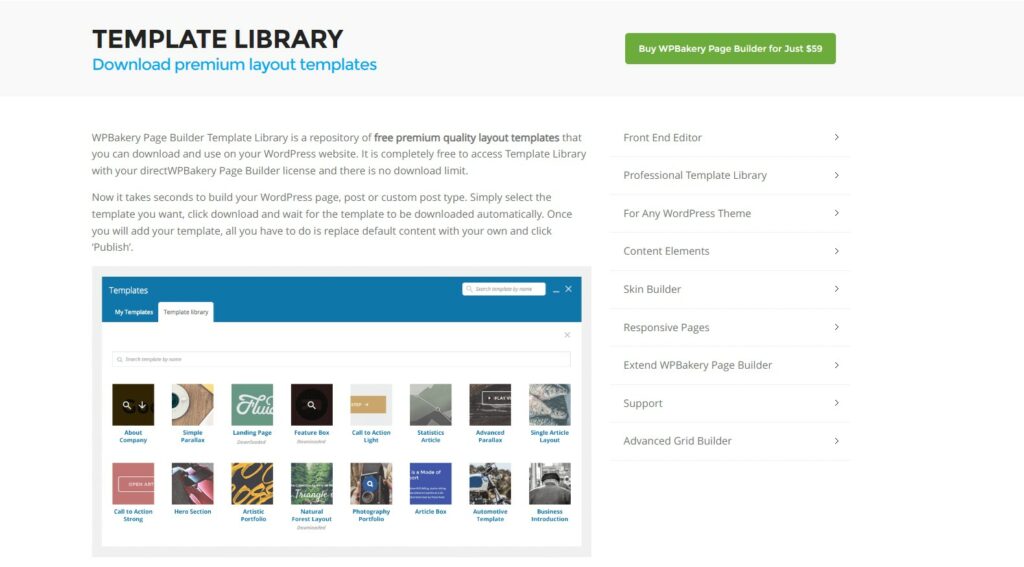
The flexibility allows you to add or remove functionalities from the provided templates, giving you ample room for customization. With a decent number of options available, you will likely find a suitable template for your needs.
Elementor
Elementor leads this category with over 100+ theme templates and design options. It offers slightly more choices than WPBakery, although the difference isn’t significant.

Like WPBakery, Elementor allows you to modify pages and templates to create a unique website. You can also enhance functionalities through widgets, mirroring the capabilities of WPBakery.
Final verdict: It’s almost a tie, with Elementor holding a slight advantage in terms of quantity. Nevertheless, both page builders offer exceptional design options that empower you to create stunning websites without the need for coding skills.
Support
Both WPBakery and Elementor prioritize customer support and provide dedicated assistance to their paid users. You can contact the respective providers for any difficulties, and they will respond promptly.
Additionally, both page builders benefit from large and supportive communities that can offer guidance and help when needed.
As established players in the industry, WPBakery and Elementor have garnered a significant customer base and are known for delivering satisfactory support services. Therefore, both page builders excel in this aspect, earning equal appreciation.
Having considered various aspects of both page builders, let’s now delve into the pros and cons of each to gain a comprehensive understanding.
WPBakery vs Elementor: Pros & Cons
Both WPBakery and Elementor have their strengths and weaknesses, making them suitable for different types of users. Let’s take a closer look at the pros and cons of each page builder.
WPBakery: Pros and Cons
| Pros | Cons |
|---|---|
| Front-end and back-end editors. | Steeper learning curve for beginners. |
| Wide range of design and theme templates. | Not user-friendly when making changes |
| Strong developer community support. | Reliance on short codes. |
| Platform-native features | No free version available. |
Elementor: Pros and Cons
| Pros | Cons |
|---|---|
| Free version offers almost 40 widgets and elements. | Pages built with Elementor may require speed optimizations. |
| Pages remain live and running even after removing the plugin. | A little towards the beginner side. Those who like customizations may prefer WPBakery. |
| User-friendly iinterface, suitable for beginners. | Limited options in the free version. |
| Active developer community support. | Some users reported glitches with recent updates |
Alternatives to WPBakery vs Elementor
While WPBakery and Elementor are popular choices, there are several other WordPress page builders available. Here are some notable alternatives:
Each of these alternatives has its own strengths and weaknesses. However, WPBakery and Elementor continue to be the preferred choices among web developers.
Interested in some other comparisons? Check out the following:
You can also checkout our in-depth article on Breakdance page builder here.
WPBakery vs Elementor: Who Wins?
WPBakery and Elementor are both prominent players in the page builder market.
In this blog comparison, it’s evident that they are closely matched in many aspects. However, my personal preference is Elementor for two main reasons: its provision of a free version and its user-friendly interface, making it ideal for beginners.
Aside from that, both builders offer distinct features that cater to specific target audiences. WPBakery grants more flexibility to developers and those with technical expertise.
Ultimately, the decision is yours to make!
Q. What is the main difference between WPBakery and Elementor?
A. There are two main differences between WPBakery and Elementor:
Pricing: Elementor offers a free version, while WPBakery is a paid-only plugin.
User-Friendliness: Elementor is more beginner-friendly, whereas WPBakery caters more towards developers.
Q. Is WPBakery better than Elementor?
A. It depends on your specific needs. WPBakery has features that make it a preferred choice for certain users. However, Elementor’s free version and user-friendly interface make it more popular overall.
Q. Which page builder is best for WordPress?
A. Elementor is generally considered the best page builder for WordPress due to its free version and beginner-friendly design.
Q.Is WPBakery cheaper as compared to Elementor?
A. Yes, WPBakery is cheaper in terms of its payment model. It offers a lifetime payment option for a similar cost that Elementor charges annually. However, Elementor is cheaper for beginners as it provides a free version, unlike WPBakery.
Q. Can I switch from WPBakery to Elementor?
A. Switching from WPBakery to Elementor can be challenging. WPBakery utilizes shortcodes, and deactivating the plugin can cause your website pages to become dysfunctional. While it’s not impossible to switch, it can be a hassle.
Q. Which is better Elementor or WPBakery?
A. Elementor is generally considered better due to its beginner-friendly nature and the availability of a free version.
Customer Review at 
“Beautifully optimized hosting for WordPress and Magento”
Arda Burak [Agency Owner]
Raza Aslam Lakhani
I’m a digital content producer at Cloudways. I’m also a hodophile- always ready to explore new places and cultures.
Other than that, I play guitar and love to indulge myself in deep, meaningful conversations. Always looking for opportunities to learn new things.
